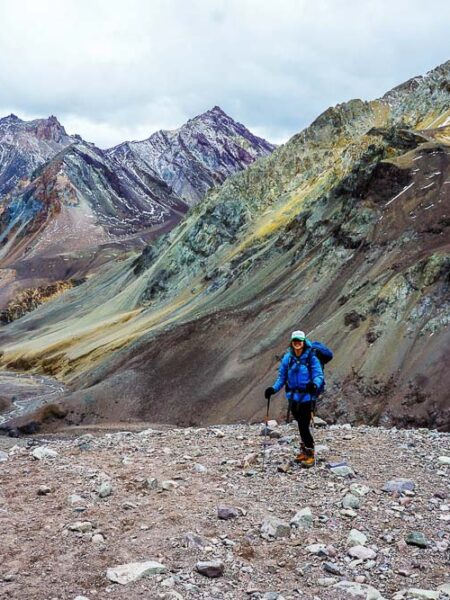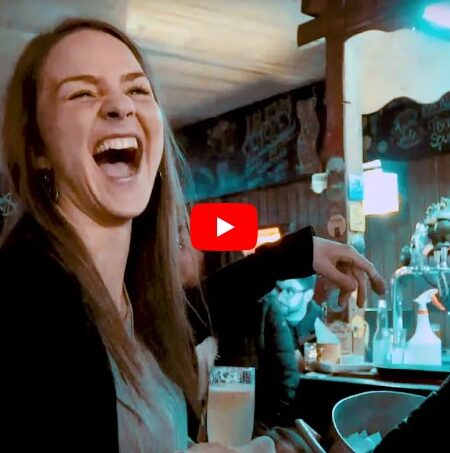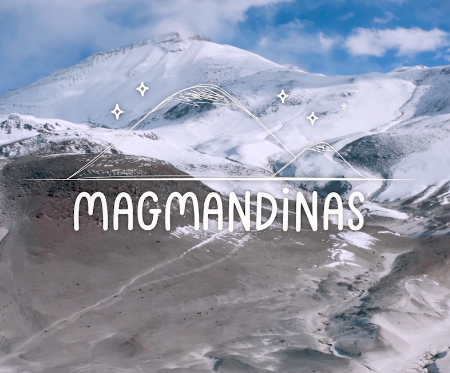Note: This article “Former Watertown resident turns tragedy into triumph” was written by Ed Zagorski of the Watertown Daily Times for the Family and Friends Magazine in Fall 2020. Click here to read the original article, with pictures, on pages 8 -13.
–
She was stuck on a mountain alone.
If tears were an option, she would’ve cried. She felt weak, desperate and defeated. She screamed for help, but knew no one was going to come for her.
Chelsey Berg was sitting on an incline atop a 20,600-foot glacier in the middle of the night. It was March 6, 2019. What the 32-year-old Watertown native calls her “worst day.”
What began as a team-building experience became a lesson in the fragility of life coupled with an examination of empowerment and free will.
On Jan. 23, 2018, Berg stoodat the top of Argentina’s Aconcagua, at 22,842 feet the highest mountain outside of Asia and one of the world’s Seven Summits, which are each the tallest mountains on every continent. They are also the mountains Berg has on her list to summit.
Berg, who continues to train and push her body to its limit to eventually climb Mount Manaslu, a 26,760-foot mountain in the Himalayas, decided on the Ojos del Salado expedition. She said it was a preparation climb as part of that more challenging excursion.
A GUIDE BY YOUR SIDE (AND IN YOUR INBOX)
My “Word Cairns” newsletter sends inspiration, tips, stories, and photos from wild corners of this world. Plus, you’ll be the first to know about new expeditions, activities, and special offers.
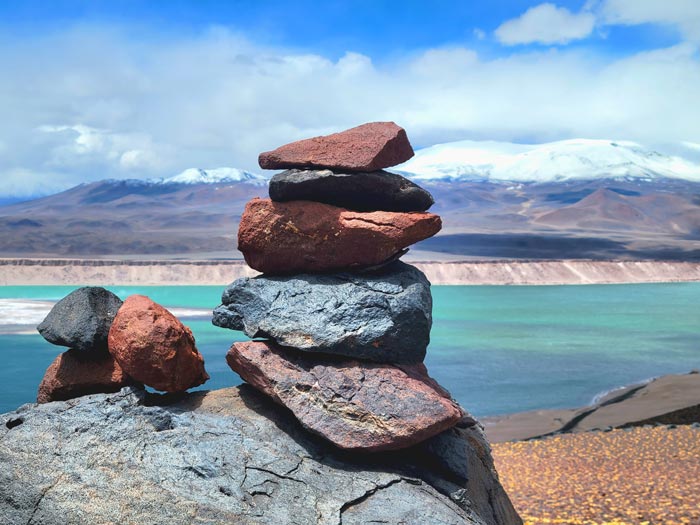
Hours before she had found herself stranded, Berg and her friends, Antonio and Pablo, set out to climb Ojos del Salado, the roof of the Andes, and also the highest point in Chile and second in South America. Berg said solitude is a defining characteristic of Ojos del Salado. Even though it’s 22,615 feet make it the tallest volcano in the world, it doesn’t receive the heavy foot traffic. She said it is normal for a group of only a handful climbing at the same time, and it’s rare for the different groups to be on the same schedule.
“It was an important team bonding opportunity because we had never climbed together before,” Berg said. “It is a rule of thumb to progressively build experience on the mountain with a new group. “However, since each person had already been to Ojos del Salado and Pablo and Antonio had summited multiple times,” Berg continued, “we did not consider it too high of a risk for our first group climb.”
What wasn’t deemed a risk became a nightmare for Berg, but one she doesn’t regret experiencing. “It was a very difficult period of my life, but so many positive things have happened since,” she said.
Berg, Antonio and Pablo were in Camp Tejos, which is located in the Andes on the Argentina-Chile border at an elevation just over 19,000-feet. During March mornings and nights, the temperature is between -4 and -15 degrees. They were on the mountain for five days already, but March 6 was the day the trio planned to summit.
“It was cold as expected, but with clear skies and low wind, I was ecstatic,” Berg recalled. “All the variables seemed to be in place for a relaxed, successful summit day.”
The small group left camp at 4 a.m. and planned to hit the summit by 1 p.m. Berg led her friends in the darkness for the first couple of hours. She had been training intensely before this climb and felt strong enough for the ascent. Although her body began to feel the effects of the altitude, she continued with slow, steady steps to maintain a controlled heartbeat and keep her muscles warm.
“It is important to find that pace where you can keep climbing for at least an hour or two without stopping,” she said. “Getting started after a break is hard enough, but if you and your muscles get too cold, it can be difficult to recover not only one’s temperature, but pace as well.”
She said about 7 a.m. the sun began to rise over the many 20,000-foot mountains and volcanoes scattered before the group. They continued to zigzag through the scree, a collection of broken rock fragments at the base of mountain cliffs or volcanoes that has accumulated through periodic rockfall from adjacent cliff faces. The group walked through the broken rock with their crampons, which are traction devices attached to footwear to improve mobility on snow and ice to a glacier. Once there, they removed their crampons and decided to leave them, ice axes and any other unnecessary equipment behind where they could retrieve it on their descent.
While Pablo was next to take the lead, Berg kept checking her watch and found they were behind schedule and should have summited already. “I admitted we were walking slower than planned,” she said. “It seemed to me that we had veered to the right, crossing the volcano and taking a less steeper route than we discussed.” It was 3:15 p.m. and the trio took another break. Berg knew the group was moving slowly and may not summit, but would be able to get down by dusk. She said Pablo didn’t mind continuing, but Antonio declined to trek further.
“He was tired and ready to turn around,” Berg said. “Antonio said he felt comfortable heading back alone.” Pablo and Berg reached a crater on the glacier at 22,113 feet, nearly 1,500 feet from the summit. While she waited for Pablo to reach her, Berg admired the view and marveled at the beauty the day had brought them. “With the ‘warm’ weather and absence of wind, I wasn’t worried about time,” Berg said. “We still had plenty of time to cross the glacier during daylight. We’d do the zigzag in the dark just as we did in the morning, but that was no big deal.”
Berg sat with her face soaking in the sunlight. It wasn’t long before she was joined by Pablo, who said rather anxiously, “We need to go down.”
Berg wasn’t sure what happened and noted Pablo’s sense of urgency wasn’t what she was expecting. She said she realized Pablo must have been more fatigued than she noticed. He then in a matter of seconds, picked up his ice axe and disappeared in self arrest, which is a mountaineering technique in which a climber slides down a snow or ice-covered slope and stops with the help of an ice axe. He was gone.
Berg hesitated to do the same. She gave it a great deal of thought, but she didn’t want to be left alone. She was a long way from the place she called home.
Berg graduated from Watertown High School in 2005 and Marquette University in December 2008 with a degree in marketing and internationalbusiness. She is employed as a marketing manager for an international talent development and transition firm. She moved to Chile because she wanted to live in another country and learn Spanish. Berg said she had studied abroad, backpacked and wanted to round out the experience by living in another place.
She was definitely in another place.
She was sitting on a glacier wondering what she should do next. With her gut in a knot, and against her own intuition, she went down in self arrest. Berg said the snow and ice was extremely hard; and she gained tremendous speed down the glacier. “I lost control and was free sliding down the glacier,” Berg recalled.
As she slid and passed Pablo on the glacier, stopped after sliding about 200 feet.
Although she was completely surprised and fortunate to be alive the cold snow began to burn her cheek. Pablo quickly made his way over to Berg and looked disturbed at what he’d just seen. He asked Berg her name, checking her for signs of a head injury. She asked him how her face looked and Pablo replied, “not good.”
Berg admitted she was in a bit of shock and wanted to get off of the glacier, as did Pablo. He then disappeared. Again, self-arresting down the glacier. Once again, he was gone.
Berg thought camp was about an hour and a half away. She thought Pablo was going to find Antonio and they would come and get her. Timed passed. She yelled their names. “Antonio!” “Pablo!”
She didn’t hear a response and eventually night hit. Now she was sitting on a glacier in the middle of the night. Waiting. Waiting for someone to hear her screams. Berg felt vulnerable and fragile. All alone. The grim reality began to set in. But Berg’s heart began to slow its beats and her breaths became shorter. She actually felt “one” with the mountain and began to grow calm.
“I was one little dot that just blended into all the immensity,” she said. “The fear started to fade.”
Berg realized she needed to get off the ice. She believed it was better to slide by choice than plummet down headfirst and unconscious. She thought it was her best chance for survival. Without further internal arguing, she stuck her feet out in front of her, put her hands on the ice to push off and let herself go.
“I was going so fast and it was so unbelievably scary,” she said. “My cheek was crushed against the ice and her face became even more scraped as she slid down in the darkness. Her head bounced from side to side. “I hit the bottom,” she said. “My body crashed against the rocks, and my head struck a hard surface. I remember the huge, loud thump. Then everything went black.”

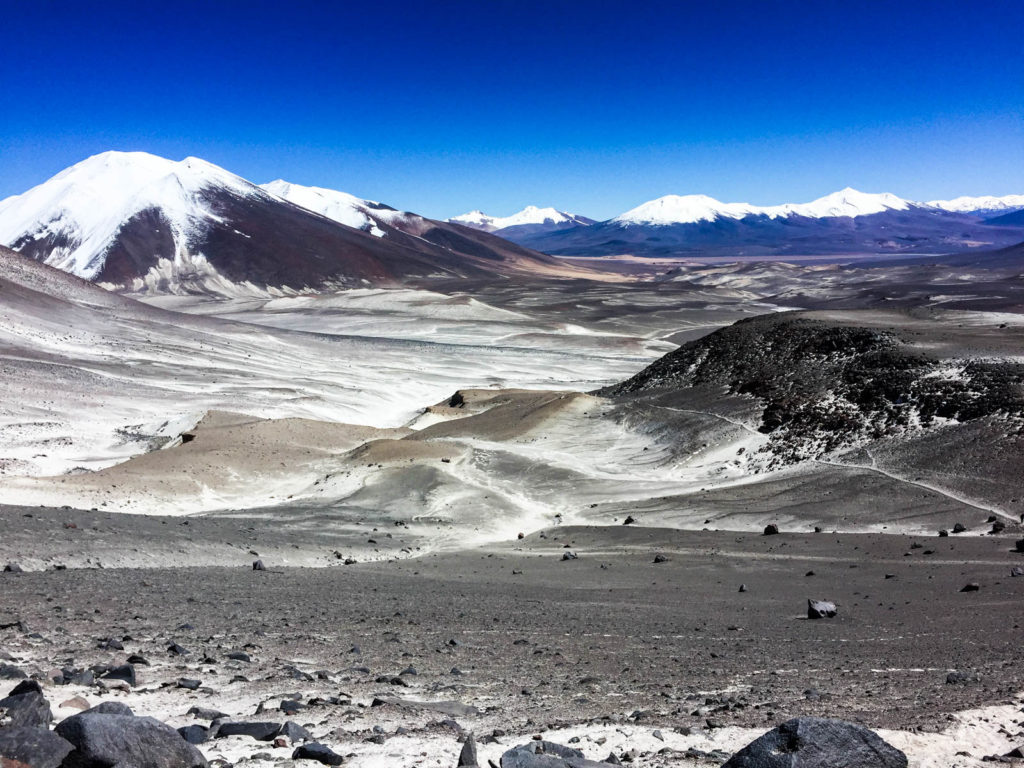


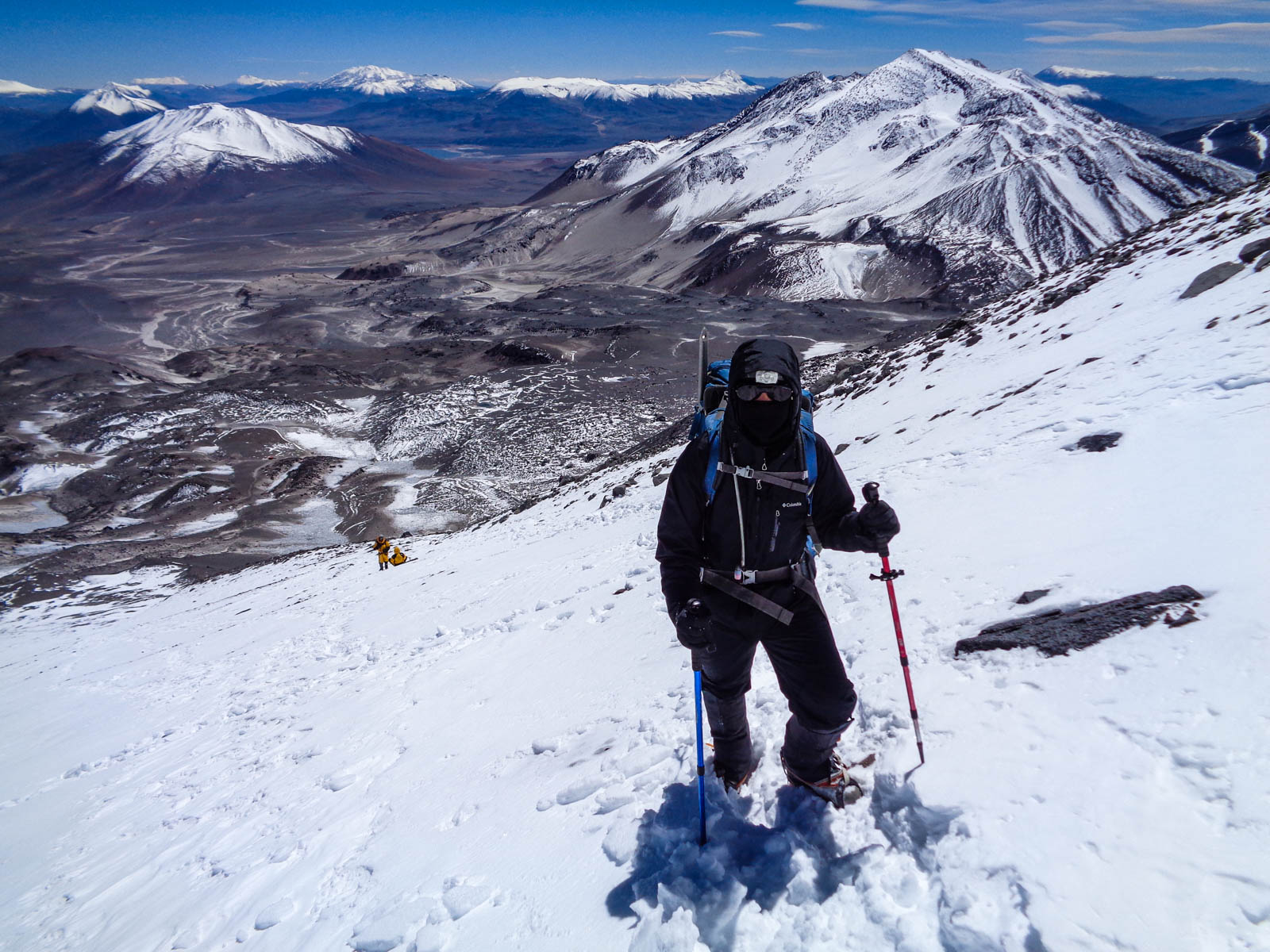
Sometime after sunrise on March 7, Berg began to open her eyes. She was likely out for 12 hours. She pushed herself to wake up. She used every remaining surge of energy inside of her to wake. What she believed to be a dream wasn’t. She knew she needed to get up. She needed to move. Berg kept telling herself over and over, “I have to get to camp. I have to get to camp.”
She eventually sat up and lifted each leg, putting one in front of the other and began dragging herself down the glacier. Although it was slow, Berg was making progress.
While she couldn’t see clearly, Berg did catch a glimpse of her right hand. It was swollen and beat up. She kept dragging herself down and began screaming for help. Berg knew she needed to get to camp. While alternating her cries for help, she slowly dragged her banged-up body down the glacier. She thought she could walk, but when she got up, she crumpled to the ground. She pushed on.
“My cries became more desperate with each pull forward,” Berg said. “I was losing momentum, but fighting against it. All of a sudden, she heard a voice, “Amiga, we’re here!”
The two men were mountain guides, who Pablo and Antonio, gathered from nearby camps requesting help in locating Berg. With a group of eight mountain guides, the search began and she was found. Now, it was a race to find medical attention for her. Berg said she told them she needed to get to camp. They told her that’s where they were headed. The two men tried walking her down the mountain, but Berg couldn’t walk so they took turns taking her down “piggyback” style. The two men placed Berg in her sleeping bag and then in back of a truck. It was there she was reunited with Antonio, who frantically drove her and Pablo to camp and into a waiting ambulance.
Berg said the ambulance belonged to one of the mining companies in the area. The ambulance took her to Paso San Francisco, which is between Chile and Argentina, and 150 miles later from when she was placed in the first ambulance into another one. Berg was headed to a public hospital in Copiapo, which was 170 miles away.
“We got to the hospital and they wheeled me into urgent care,” she said. “I remember being put on the bed and wheeled in. They hooked me up to an IV and gave me medicine.” Antonio was talking to a doctor in Santiago, the capital of Chile, where there is better medical care. She could be flown to Santiago, but Berg was at a public hospital, and had private insurance. She would have to wait hours before reaching the hospital in Chile. Antonio told Berg they could leave immediately and be there before 9 a.m.
Berg signed a release and was ready to leave, but caught a look at herself in the mirror.
“I was taken aback when I saw my bloody, dirty, puffy face,” she said. “One eye was totally black and blue and almost swollen shut. There was a big gash under my right eyebrow. I couldn’t believe it was me. I didn’t recognize myself.”
Her recovery would not be easy.
Months later with many moments of reflection, she said life for her is different now.
“Lucky to be alive, I’m currently putting life back together, healing a body that suffered severe frostbite, processing what life could be like with shorter fingers on my right hand … and stumbling along, but with my head up, on a long road to recovery.”
Because of frostbite, the four fingers on her right hand after the first knuckle needed amputation as did the tip of her left index finger. She also endured a skin graft on her right glute, the muscle on her buttocks. “It was a long and very difficult six month battle to save what I was able to save,” Berg said.
But she says she’s not afraid and more determined than ever to go on the offensive. Enduring what she did, Berg doesn’t have second thoughts about mountain climbing.
”No, I am more passionate than ever about the mountain and its role in my life. It is where I feel most free, most connected to the world, and most me. In the end, the mountain wasn’t the problem. Accidents can happen anywhere and the key is being better about evaluating, preventing, and managing risk. The skills and mentality I learned to be successful in the mountain are the same stills that helped me keep my head up and not lose sight of my objective during the recovery.
Chelsey Berg
“It gave me the discipline I needed to push through when I didn’t have anything left in me. The thought of getting back is what has motivated me to workout daily, even though I’ve been stuck in quarantine for four-plus months and unable to go outside and push through the physical challenges to recover my condition and functionality.”
While others may quit, Berg said she hopes to be able to make it back to Ojos del Salado this upcoming season. “I want to emotionally close the cycle as well as give the mountain thanks for letting me make it,” she said. “As soon as quarantine lets up and I can get back into the mountain, my focus will be on adapting and relearning technical skills, in order to get back to climbing bigger and harder mountains. I have to learn how to use my new hand for those kinds of activities, and will have to adapt certain things while learning to do others with my left hand. And, not to be underestimated, I’ll surely need to regain confidence and also likely overcome the probable fear of falling.”
She said her overriding goal is climbing the Seven Summits, climbing big mountains in the Himalayas, and doing traverses in the Ice Fields in Chile.
Berg writes about her travels on her Instagram account @findingthenorth and her website www.findingthenorth.com
Related Articles

I'M TALKIN' TO YOU
Purpose-driven people who feel compelled to make life meaningful for yourself and others.
Outdoor-inspired people whose best self comes alive when experiencing beautiful places and pushing your limits in the open air.



